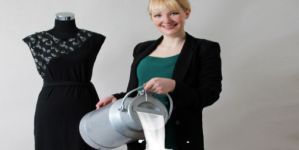Article
Hypoallergenic Clothes Made from Organic Milk the Up-and-Coming Fad
Author(s):
According to 28-year old German biochemist/fashion designer Anke Domaske, the latest fad that is friendly to allergy-prone skin is milk-made clothing. Known as "Qmilch," which combines the German word for milk and a sense of ‘quality,' the fabric's texture is most similar to silk but is washable much the same as cotton.

According to 28-year old German biochemist/fashion designer Anke Domaske, the latest fad that is friendly to allergy-prone skin is milk-made clothing. Known as "Qmilch," which combines the German word for milk and a sense of ‘quality,’ the fabric’s texture is most similar to silk but is washable much the same as cotton.
Domaske reported that her journey to create a natural and non-irritating fabric began after years of witnessing the suffering her stepfather went through from skin irritations while being treated for cancer. "There are so many people who really suffer just by wearing normal clothing.” She said. “I wanted to find a way to help them. I thought it must be possible to make a fabric that is completely organic," said Domaske.
She began by researching milk protein, or casein, in a research lab. Following two years of trial and error, Domaske and her six-person team eventually discovered a process which reduces milk to a protein powder which is then boiled and pressed into strands that can be woven into a fabric.
According to Domaske, the strands can either be spun rougher for a heavier texture softer for to create a silk-like fabric. Domaske also reported that she only uses organic milk that cannot be consumed by humans as it has failed Germany's strict quality standards.
Qmilch earned an award of innovation and was acknowledged by the Germany's Textile Research Association as a radical, sustainable fiber that could transform the clothing industry. "We know that everything that is based on oil has a limit, that materials like cotton that take up a lot of land, water and chemicals are limited, so we need to think about how we in produce fabrics and textiles in the future," said Klaus Jansen, who heads the Textile Research Association. "She has showed us how this can work."
So far, the fabric has only been used to create dresses for her own MCC fashion line, but Domaske plans to begin mass producing the product by next year, and she already has numerous companies lining up at her door. "At first I did not believe that it was made from milk, but when you work with it, you notice that it feels different from normal fabrics," said Tatjana Berthold, a seamstress for Domaske's MCC fashion line who has been working with the fabric for the past year.
The future of this fabric, however, is far from limited to hypoallergenic clothing; Domaske has already received requests for automobile seat covers, and several medical personnel have approached her inquiring about hypoallergenic material for hospital beds and gowns.
"When you look it, you can't see such a big difference, but when you wear it, you feel the difference," Berthold stated.





